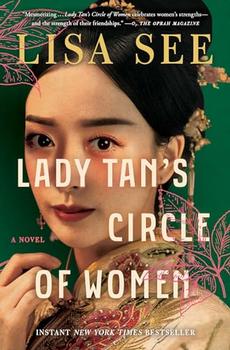Summary | Excerpt | Reading Guide | Discuss | Reviews | Read-Alikes | Genres & Themes | Author Bio

A Novel
by Lisa SeeThe latest historical novel from New York Times bestselling author Lisa See, inspired by the true story of a woman physician from 15th-century China - perfect for fans of See's classic Snowflower and the Secret Fan and The Island of Sea Women.
According to Confucius, "an educated woman is a worthless woman," but Tan Yunxian—born into an elite family, yet haunted by death, separations, and loneliness—is being raised by her grandparents to be of use. Her grandmother is one of only a handful of female doctors in China, and she teaches Yunxian the pillars of Chinese medicine, the Four Examinations—looking, listening, touching, and asking—something a man can never do with a female patient.
From a young age, Yunxian learns about women's illnesses, many of which relate to childbearing, alongside a young midwife-in-training, Meiling. The two girls find fast friendship and a mutual purpose—despite the prohibition that a doctor should never touch blood while a midwife comes in frequent contact with it—and they vow to be forever friends, sharing in each other's joys and struggles. No mud, no lotus, they tell themselves: from adversity beauty can bloom.
But when Yunxian is sent into an arranged marriage, her mother-in-law forbids her from seeing Meiling and from helping the women and girls in the household. Yunxian is to act like a proper wife—embroider bound-foot slippers, pluck instruments, recite poetry, give birth to sons, and stay forever within the walls of the family compound, the Garden of Fragrant Delights.
How might a woman like Yunxian break free of these traditions, go on to treat women and girls from every level of society, and lead a life of such importance that many of her remedies are still used five centuries later? How might the power of friendship support or complicate these efforts? Lady Tan's Circle of Women is a captivating story of women helping other women. It is also a triumphant reimagining of the life of a woman who was remarkable in the Ming dynasty and would be considered remarkable today.
Coming soon.
Here are some of the comments posted about Lady Tan's Circle of Women.
You can see the full discussion here.
A case could be made that Yunxian was a modern woman. What are some of the ways she balances work and family? Do you see yourself in her?
Yunxian’s determination to become an excellent midwife and healer gave her strength to take chances that could have resulted in serious consequences due to the inferior position of women in Ancient China. Women now, six centuries later, ... - jenny
Discuss the relationship between Yunxian and her servant Poppy and how it evolves throughout the novel. When do you think Yunxian comes to fully appreciate Poppy and see her as a real human being? How does that change their relationship?
Yunxian was forever a part of her privileged class. Even though she did have some realization of Poppy being a person and not just for her own convenience and care, she still held herself separate and above her, and did not take any initiative to ... - barb23703
Each character—and Yunxian’s relationship to that person—changes and evolves over time. How does Yunxian come to see and understand the characters of Miss Zhao, Miss Chen, Lady Kuo, Doctor Wong, and her husband and father?
Yunxian's relationship with all of these characters changed over time. Society has mandated how their relationships need to be, but as Yunxian matures she begins to see these people in a different way and allows herself to relate to them more as... - kdowney25
Grandfather Tan and Grandmother Ru have very different ideas about childbirth. Who do you agree with, and why? Do you think these contradictory ideas still hold true today - not just for childbirth but for women’s medical care in general?
I do think that the differences between men and women’s health care is still an issue. Grandmother thinks that most women's issues are blood related. Grandfather finds midwives to be charlatans. I think that practitioners that treat the ... - redheadedsusie
How are aphorisms important to the story? What message is Miss Chen trying to convey to Yunxian? Lisa considers these aphorisms to be true across time and cultures. Do you agree? How have they played out in your life, if at all?
Lisa often uses aphorisms to help illuminate a character or a plot point. One of the most significant in this novel is No mud, no lotus. Discuss how this aphorism is important to the story. On page 256, Miss Chen recites a series of aphorisms to ... - kimk

If you liked Lady Tan's Circle of Women, try these:





